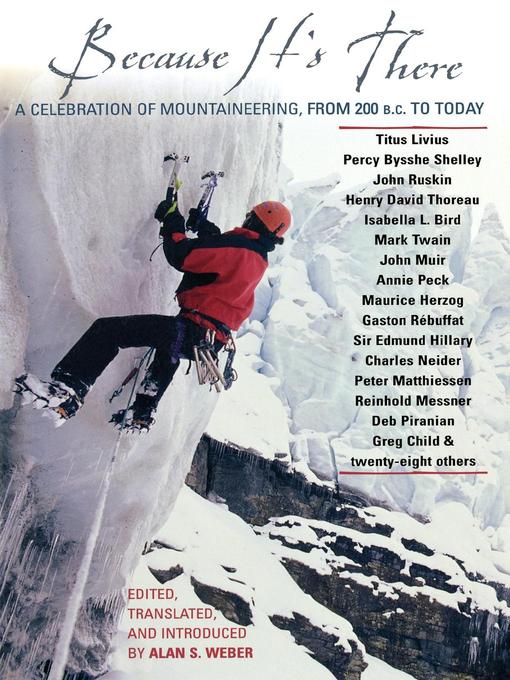
Because It's There
A Celebration of Mountaineering from 200 B.C. to Today
کتاب های مرتبط
- اطلاعات
- نقد و بررسی
- دیدگاه کاربران
نقد و بررسی

January 27, 2003
From Livy's account of Hannibal's grim crossing of the Alps to entries by contemporary climbers that refer casually to oxygen tanks and brand-name stoves, Weber, a historian and avid climber, has assembled an anthology of poets, scientists and climbers who effectively evoke Weber's observation that the allure of mountaineering emanates from its status as"an endeavor ... in which every step represents a simple dividing line between what you are and what you might become." Sixteenth-century scholar Josias Simler penned the first known Alpine"climbing guide," and the modern mountaineer may be quite surprised to find out that the equipment he or she uses--crampons and snowshoes, for example--were used in Simler's day. Poet Andrew Marvell's"Upon the Hill and Grove at Bill-Borow" is the first of several poems conveying both praise and fright of mountains, but climbers do not enter the narrative until Jacques Balmat's breathless account in 1786 (romanticized by Alexander Dumas) of the first great ascent, Mont Blanc. Climbers dominate the anthology thereafter, and Weber includes contributions from such familiar names as Sir Edmund Hillary, Maurice Herzog, Eric Shipton and the inimitable Reinhold Messner. Less well-known figures who have been as important in both climbing and writing include Australian climber Greg Child, Leslie Stephen (the father of Virginia Woolf) and Geoffrey Winthrop Young, guru to a whole generation of British climbers. Women (Isabella Bird, Annie Peck and Deb Piranian) reflect on climbing, Mark Twain satirizes luxury Alpinism, and there's even a disaster--Edward Whymper's account of the tragic first ascent of the Matterhorn. This fat tome is a browser's joy.

May 1, 2003
From Livy's account of Hannibal's grim crossing of the Alps to entries by contemporary climbers that refer casually to oxygen tanks and brand-name stoves, Weber, a historian and avid climber, has assembled an anthology of poets, scientists and climbers who effectively evoke Weber's observation that the allure of mountaineering emanates from its status as"an endeavor ... in which every step represents a simple dividing line between what you are and what you might become." Sixteenth-century scholar Josias Simler penned the first known Alpine"climbing guide," and the modern mountaineer may be quite surprised to find out that the equipment he or she uses--crampons and snowshoes, for example--were used in Simler's day. Poet Andrew Marvell's"Upon the Hill and Grove at Bill-Borow" is the first of several poems conveying both praise and fright of mountains, but climbers do not enter the narrative until Jacques Balmat's breathless account in 1786 (romanticized by Alexander Dumas) of the first great ascent, Mont Blanc. Climbers dominate the anthology thereafter, and Weber includes contributions from such familiar names as Sir Edmund Hillary, Maurice Herzog, Eric Shipton and the inimitable Reinhold Messner. Less well-known figures who have been as important in both climbing and writing include Australian climber Greg Child, Leslie Stephen (the father of Virginia Woolf) and Geoffrey Winthrop Young, guru to a whole generation of British climbers. Women (Isabella Bird, Annie Peck and Deb Piranian) reflect on climbing, Mark Twain satirizes luxury Alpinism, and there's even a disaster--Edward Whymper's account of the tragic first ascent of the Matterhorn. This fat tome is a browser's joy.
Copyright 2003 Library Journal, LLC Used with permission.

























دیدگاه کاربران